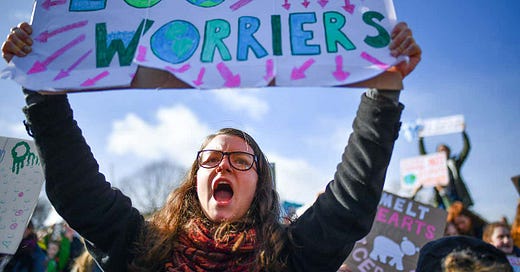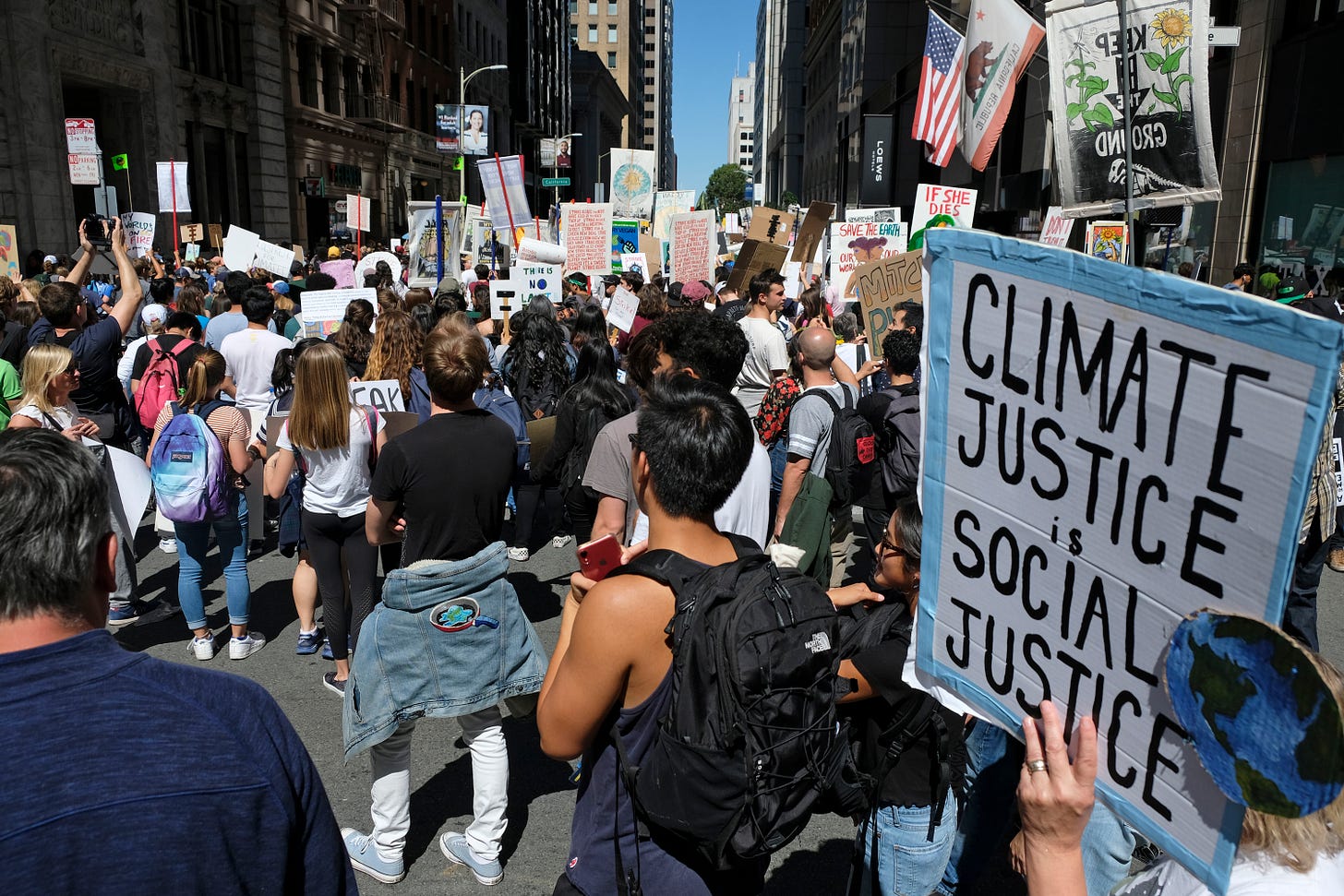Feeling stressed out about the climate apocalypse? The Green Fix on eco-anxiety
Mindfulness might not quite cut it this time.
It’s like this.
There are islands that our grandchildren will never see.
When someone tells me I have a lifetime to achieve my climate writing career goals, I disagree. I think I have less than ten years.
There’s a new word for homesickness at home - solastalgia - because ‘home’ is irretrievably in the past now.
And I worry. I worry that my actions are somehow making everything worse. Did my local takeaway coffee support local small businesses or add to single-use pollution?
I worry that writing The Green Fix is just an extended coping mechanism to tell myself I’m making a difference.
I am one of the lucky ones. Privileged and still relatively shielded from the impacts of global heating. And I am anxious. Eco-anxious. And eco-angry, eco-hopeful and about to eco-freak the fuck out.
So here’s what we do.
***
The Green Fix is collaborative: I write about what you want to hear about. This relies on people sending in their questions and suggestions. Shape the newsletter by taking part in the Instagram polls and filling in this feedback survey.
***
Do you find the Green Fix useful? Then help me out by sharing it! I run The Green Fix for free, in my own time. This means I don’t have the time to promote it as widely as I’d like to. If you like this newsletter, please help me by sharing it using the button here:
What’s Going On?
Fossil fuel companies have received $3.8 trillion in funding from the world’s biggest banks in the 5 years since the Paris Agreement.
Related: How to switch to an ethical bank.Amazon rainforest may be emitting more greenhouse gases than it absorbs, according to new study.
Related: Why are rainforests important?Indigenous groups the best protectors of forests, finds UN report.
Related: Indigenous chief Raoni Metuktire, on the destruction of the Amazon.Residents of Kenya slum tell head of major climate conference that poorer countries need more funds for climate adaptation.
Useful: What is climate adaptation?Activists protested in 68 countries for the Global Climate Strike on the 19th March, with activists demanding no more empty promises on climate action.
Useful: What else can I do to support the climate strikes?
Focus On… Eco-Anxiety
A talk with two youth activists about this growing mental health phenomenon.
Do you have eco-anxiety? The checklist:
Do you…
Feel depressed, anxious or panicky about the impacts of the climate crisis?
Feel paralysed with stress or despair over environmental destruction?
Do these feelings affect your everyday wellbeing?
Congratulations, you’ve had eco-anxiety. Join the rather large club of people having rational reactions to the prospect of mass extinction.
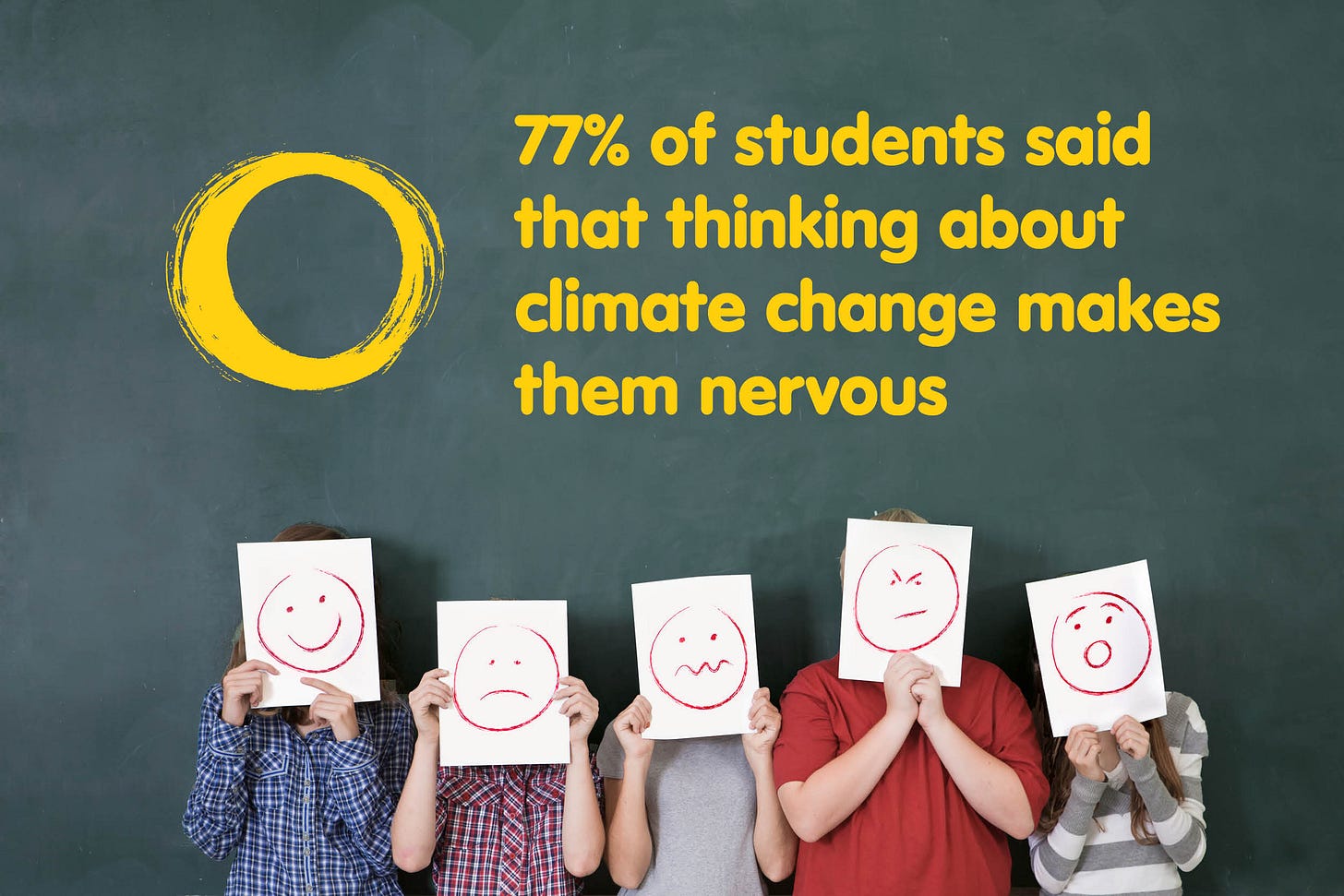
“I think all climate activists have gone through some level of eco-anxiety. I certainly have,” says Kevin Patel, founder of youth climate movement OneUpAction. “You sleep less, you have thoughts running through your head, thinking about all the different problems.”
It’s not always called eco-anxiety. Mary Annaïse Heglar talks about her experience with climate grief.
Because that’s what the anxiety is: grieving losses, present and future. Loss of our homes, loss of the comfort zone that we thought would last forever, the narrowing of options for what kind of lives we can live.
Sacha Wright, Research and Impact Coordinator at youth-led non-profit Force of Nature, calls the anxiety an epidemic.
“‘Mental health’ needs to enter the lexicon we use when educating people to take on the world’s messiest problems,” she says. “If we are not able to address the mental health epidemic, we are allowing a generation to struggle and strive against stagnation in a time when their voices are critical to the march towards progress.”
Who is most affected by eco-anxiety?
For some, ecological grief is a reaction to losses that have already happened. In Sweden, one in three indigenous Sami reindeer herders have considered or attempted suicide. The primary reason is climate change: the melting Arctic and unstable weather conditions rendering their way of life unviable.
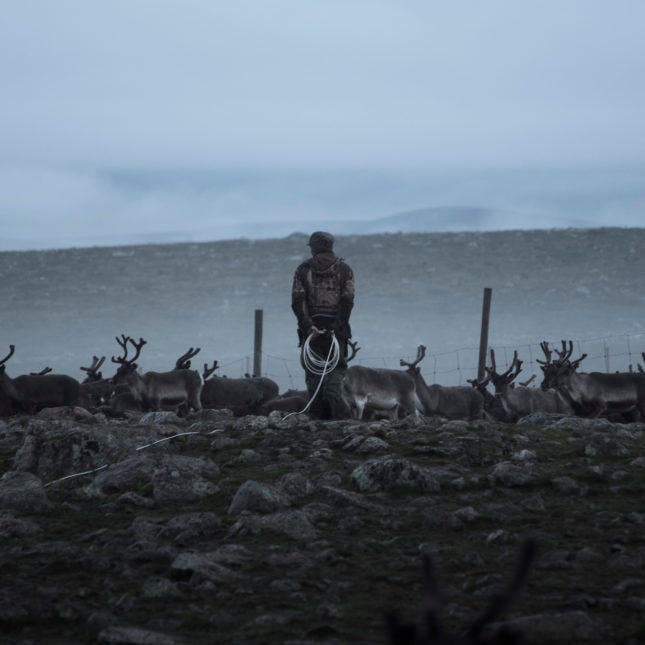
Many groups that are worst-affected by the climate crisis, like low-income communities, indigenous and marginalised social groups, have already faced climate change weathering away key parts of their livelihoods and culture - but are often left out of conversations about the climate and mental health.
The most vulnerable are the least included
Those affected by social or racial injustice are most likely to be affected by the climate crisis, the mental health impacts of said climate crisis, and also have the fewest resources to tackle the problem. This is climate injustice.
By leaving those groups out of the discussion, the climate movement excludes crucial perspectives in creating solutions that are not only environmentally sustainable, but just.
“We have to practise intersectionality and remove the barriers to including the voices of people of colour, indigenous and low-income communities into the climate movement,” says Kevin. “We as people of colour are already making our own seats and putting the conversation about climate change at the forefront.”
Marginalised groups can also often share experience in cultivating incredible resilience, Sacha points out. “It is essential to acknowledge the disproportionate effects of eco-anxiety on particular social groups whilst continually promoting the power and resilience of these communities.”
Climate action must include climate justice
“My activism journey began with fighting against apartheid,” says Kevin. “I was impacted by health issues from the smog and air pollution in south Los Angeles and when I researched it, I saw many connected inequalities in my community arising out of this injustice.”
Sarah Jacquette Ray, who wrote a book on climate anxiety, pointed out that the narrow-minded focus on the experiences of the rich eco-anxious can set a dangerous trend of ignoring the need for racial and social justice for effective climate action.
“Climate anxiety can operate like white fragility, sucking up all the oxygen in the room and devoting resources toward appeasing the dominant group,” her recent article reads. “Will they be able to see their own fates tied to the fates of the dispossessed? Or will they hoard resources, limit the rights of the most affected and seek to save only their own?”
I’m anxious and overwhelmed about all these crises. What can I do?
A recent scientific paper found that eco-anxiety doesn’t always translate to climate action - but eco-anger does.
I’m not saying that we should be walking around furious. But pushing back against the frustration and fear is exhausting. So let’s feel it. Feeling is fuelling - when we channel it into action.
“I always tell people that yes, bad things happen, but I’m not going to let any obstacle or barrier get in the way of what I want to do and what I love to do,” Kevin tells me.
Sacha echoes this. “People are incredible, and powerful, and strong - stories of resistance are all around us.”
And the great news is, we can start building that resilience and channeling that anxiety anywhere. Volunteer in the local community, educate yourself on climate justice and advocate for and talk about issues you feel passionate about.
Talk about it
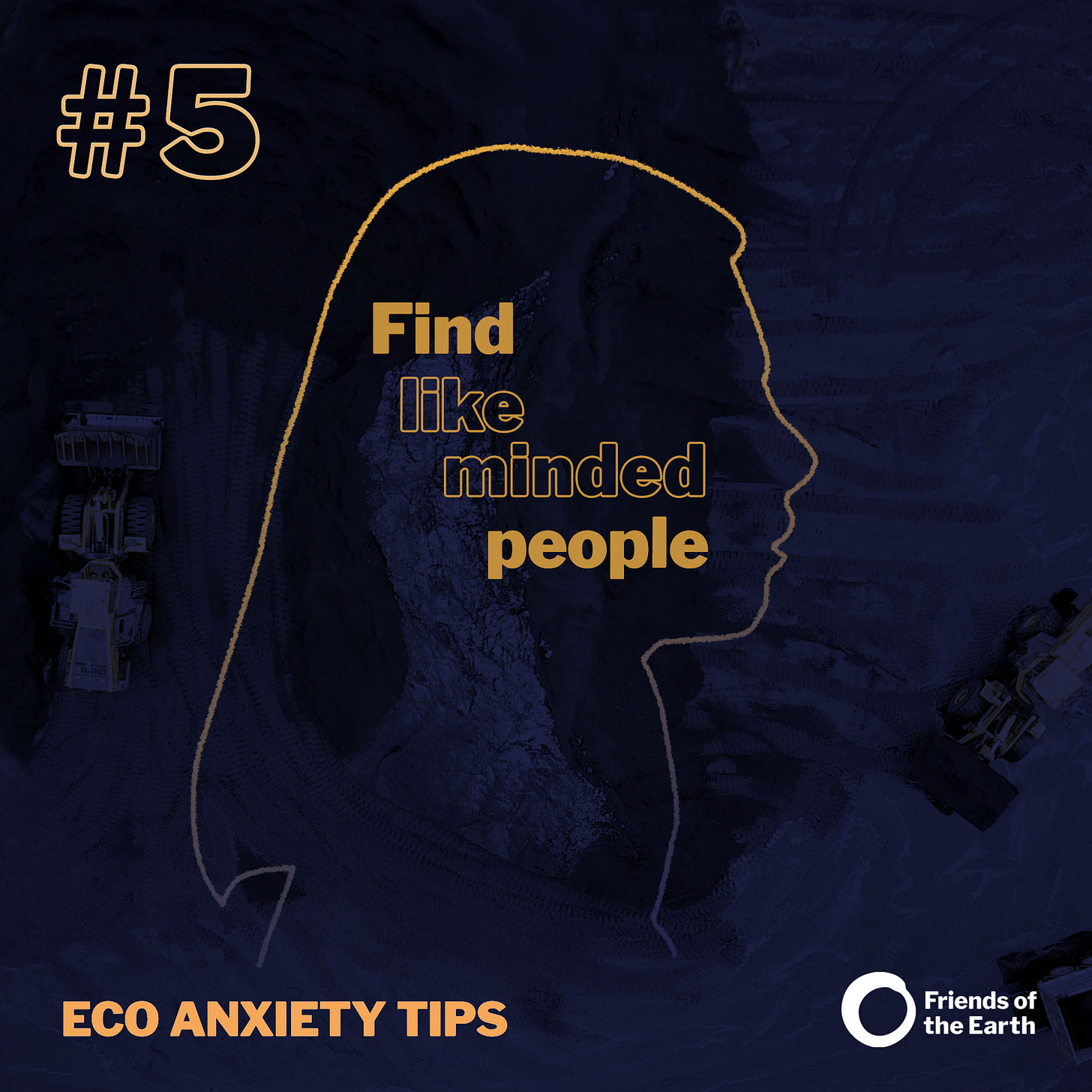
“Sometimes activists are afraid to say they have eco-anxiety, but we need to take care of ourselves if we want to take care of our community and our planet,” Kevin says.
Sacha emphasises the power that comes from sharing. “There is a universality that comes with speaking vulnerably about mental health. Incredible conversations stem from workshops that bring together students from Bangladesh, Italy, Indonesia, Nepal, Pakistan - who look at one another and say, “you’re scared as well? You’re uncertain about the future, even though you live a life that looks much different than mine?”
Anxiety is paralysing. But it can become rage, and compassion and action - love and rage, as Extinction Rebellion say.
“We cannot run from our feelings anymore than we can run from the climate crisis,” says Sacha. “We can see them, name them, accept them - then use the energy of these feelings to take action.”
So Now What Do I Do?
LEARN MORE
Read: The four stages of climate grief.
Read: Why climate-aware therapy has to be more inclusive.
Read: How to recognise brain biases holding us back from climate action.
TRY SOMETHING NEW
Use these actions for change in the articles ‘An Audacious Toolkit: Actions against Climate Breakdown.’
Try a form of ecotherapy, which improves mental health through nature.
The Good Grief Network offers online courses to manage stress about the climate (I haven’t tried it so if you have, let me know if you’d recommend!)
CHANGE THE SYSTEM
Register for ‘From the Ground Up,’ an online gathering on the 22nd - 25th April to share ideas and experience on how to work together for climate action.
Get involved in local climate action! Take Climate Action UK has an amazing hub of resources for how to get started.
The Youth Delegates of the G7 summit want young people to tell them what the EU should be working on! Fill in their feedback form.
If you have a topic you want the Green Fix to cover, fill out this feedback form & tell us your idea!
Stay in the loop
I share updates on the Green Fix, polls and additional resources on Instagram @coffee_and_casstaways. You can also say hi on Twitter.
Know someone interested in environmental issues? Forward this email to them - we want to reach people who care about doing more for the planet, with your help!


